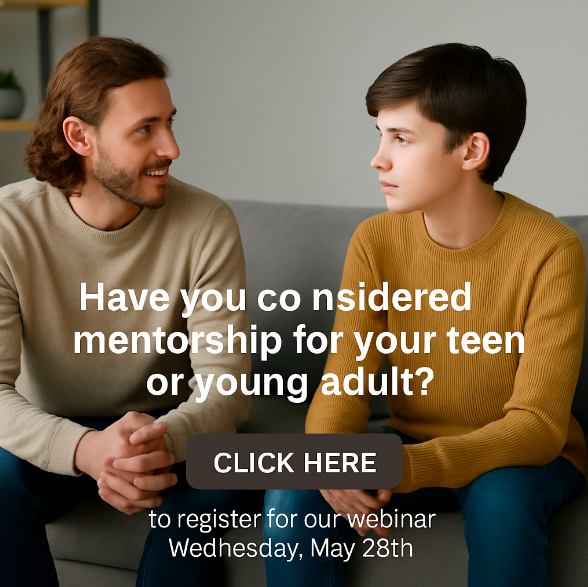Mentorship Is the Mental Health Prevention No One’s Talking About
Mentorship as the Missing Middle Between Parenting and Therapy
We often picture mental health crises as loud, disruptive events. But for many teens, it starts in silence:
A dropped hobby or sport. A shift in sleep. A slow fade into “I’m fine.”
The stats are sobering:
1 in 3 teens in Canada report experiencing symptoms of depression or anxiety.
Social media use has doubled among adolescents since the pandemic.
46% of teens say they rarely talk about their emotions with anyone at all.
Add in the echoes of recent lockdown life, academic pressure, and the pressure to appear “together” online, and it’s no wonder so many young people are struggling, quietly.
Parents Are Stretched. Teens Are Shutting Down.
If you’re a parent, you’re probably doing your best with what you have:
Showing up. Checking in. Setting boundaries.
But if it still feels like your teen is slipping through your fingers, it’s not because you’re failing.
It’s because we’re asking families to do everything without enough support.
Traditional models tell us there are two lanes:
Parent harder
Send them to therapy
But there’s a vital third lane we’ve been overlooking?
Therapy Isn’t Always the First Step Teens Need
Therapy can be powerful. But not every teen needs it, is ready for it, or wants it.
Let’s be honest:
Stigma is real: Many teens see therapy as something for people who are “broken.”
It can feel clinical: The office, the forms, the unfamiliar adult asking personal questions.
It’s not always accessible: Long waitlists, high costs, or lack of availability make therapy hard to access, especially when a teen isn’t in full crisis.
There’s a wide gap between “I’m fine” and “I need therapy.”
Mentorship fills that gap.
The Role of Mentors in the Thriving Zone
At MentorWell, we talk about the Thriving Zone. It’s that space where teens are figuring out who they are, what they care about, and where they fit in the world.
It’s where questions like these come up daily:
What if I fail?
Why don’t I feel confident?
What should I do after high school? University?
Why does everyone else seem to have it together but me?
Mentors meet teens in that space, not to fix, but to guide.
They’re trained adults who listen, reflect, and walk alongside teens as they learn emotional intelligence, resilience, confidence, and decision-making. These are life skills that school doesn’t teach, and parenting alone can’t always cover them.
Real Talk: What Mentorship Looks Like (and Doesn’t)
Mentorship isn’t therapy-lite. And it’s definitely not parenting 2.0.
Here’s what it looks like:
✅ One-on-one conversations, often virtual, for 30–60 minutes every few weeks
✅ A safe, judgment-free zone where teens can vent, ask questions, and be real
✅ Gentle guidance through the big stuff: confidence, friendships, school, identity, and more
✅ Someone who isn’t a parent or authority figure, which makes space for trust and honesty
Here’s what it doesn’t look like:
❌ Diagnosis or clinical therapy
❌ Behavioural correction or lecturing
❌ Someone trying to “fix” your kid
Mentors are neutral, trusted guides who get it because they’ve been there. That’s what makes the connection so powerful.
Your Teen Deserves a Guide, Not Just a Rulebook
If you’ve been feeling like you’re out of tools…
If your teen is shutting down and you don’t know how to reach them…
If you’re not ready for therapy, but know something needs to shift…
Mentorship might be the missing middle you’ve been searching for.
At MentorWell, we match teens with trained mentors who understand what it means to grow up in today’s world. It’s real, relatable, and rooted in connection, not correction.
Explore mentorship for your teen today.
Because prevention isn’t passive, it’s proactive.
Because your teen deserves to thrive, not just survive.
👉 Join our webinar this Wednesday, May 28th at 1pm to learn more about how mentorship can build confidence, help with direction and help forge a path towards fulfillment and purpose. If you cannot attend our webinar, register, and we’ll send you a copy of the recording.


